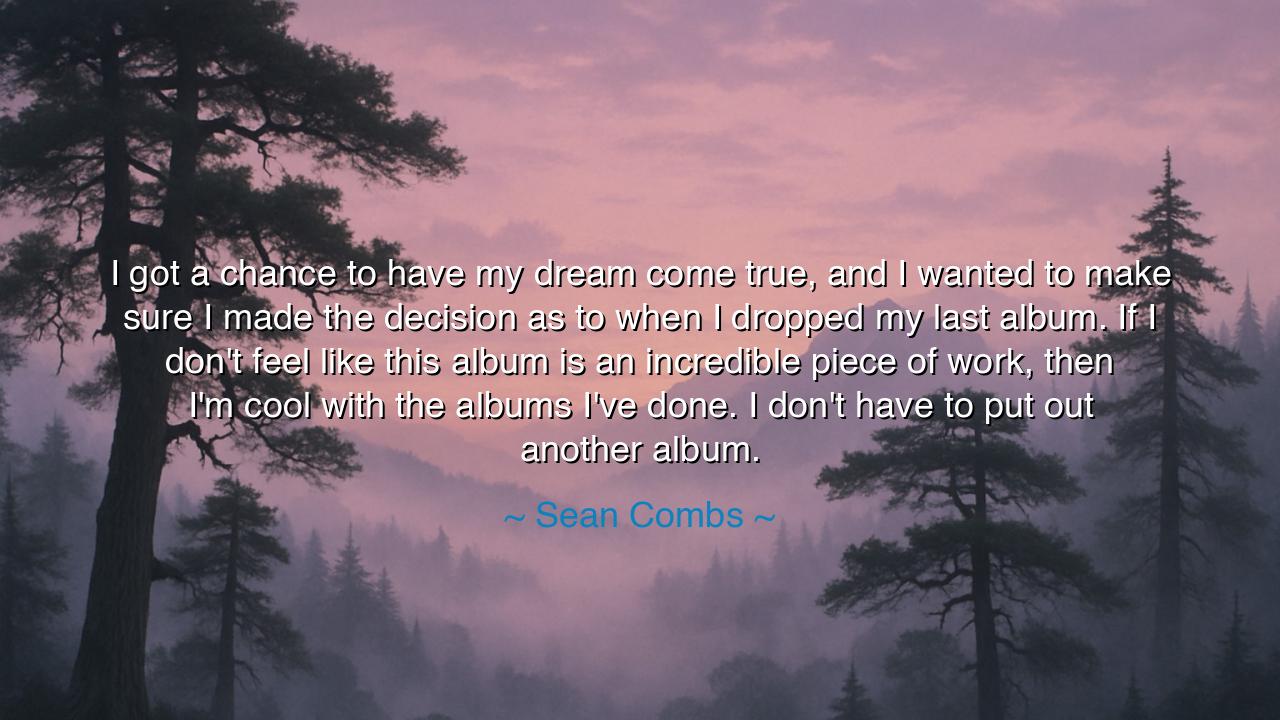
I got a chance to have my dream come true, and I wanted to make
I got a chance to have my dream come true, and I wanted to make sure I made the decision as to when I dropped my last album. If I don't feel like this album is an incredible piece of work, then I'm cool with the albums I've done. I don't have to put out another album.






In the reflective words of Sean Combs, "I got a chance to have my dream come true, and I wanted to make sure I made the decision as to when I dropped my last album. If I don't feel like this album is an incredible piece of work, then I'm cool with the albums I've done. I don't have to put out another album," we encounter a deep wisdom about the power of choice, integrity, and the true value of creative work. Combs acknowledges that he has reached the pinnacle of his dream, and now, he stands at a crossroads—a point where the decision to continue or step back is no longer determined by external forces, but by his own standards and self-awareness. The quote speaks to the importance of knowing when to end a chapter, to preserve one’s legacy, and to recognize when the work you’ve created is enough.
This concept echoes the ancient philosophical principle of moderation taught by the Greeks. Aristotle’s idea of virtue was rooted in balance, urging individuals to live in harmony with their inner nature and external circumstances. He spoke of finding the middle ground—avoiding excess and deficiency. In the case of Combs, his decision to know when his work is complete mirrors Aristotle’s teaching that fulfillment is not found in constant pursuit, but in the wisdom to recognize when one has accomplished their purpose. For Combs, the essence of fulfillment is not in continuing to create for the sake of production, but in ensuring that each work he produces is of the highest quality, that it reflects his values, and that it serves as a fitting conclusion to his legacy.
The ancient Romans also understood the power of finality. Cicero, in his letters, often spoke about the importance of knowing when to retire from public life. He emphasized that a person’s worth and dignity could be better preserved when they chose to leave the stage while still in their prime. This idea of stepping back from the work that has defined one’s life was seen not as a failure, but as an act of strength, a demonstration of self-respect and a desire to maintain the purity of one's contributions. For Combs, making the conscious decision to stop creating when he feels his work is no longer extraordinary is an affirmation of his commitment to excellence—he refuses to let the expectations of others dictate his journey.
Consider the story of Leonardo da Vinci, whose life exemplified the pursuit of quality over quantity. Da Vinci, often regarded as the greatest genius of the Renaissance, did not create vast amounts of art. Instead, he focused on a select number of masterpieces, each filled with detail, innovation, and timeless beauty. One of his most famous works, the Mona Lisa, was not rushed into completion but refined over years, with Da Vinci pouring every ounce of his genius into it. Like Combs, Da Vinci’s legacy was not about creating endlessly, but about the meaning and depth of the work he chose to release into the world. Da Vinci’s deliberate approach to his work speaks to the truth that sometimes, the greatest accomplishment lies not in doing more, but in doing what is most authentic and powerful.
Similarly, the legendary Muhammad Ali understood the value of knowing when to step away. Ali, widely considered the greatest boxer of all time, chose to retire when his health began to suffer, preserving his legacy and ensuring that his contributions to the sport were not overshadowed by a decline in ability. His decision to retire was not a sign of weakness, but of profound wisdom. Ali’s story illustrates that the greatest strength lies not in pushing beyond one’s limits indefinitely, but in the understanding of one’s true capacity and the decision to exit with dignity.
In our own lives, Combs' words serve as a reminder that our personal and professional journeys should not be governed by the whims of others or the pressures of endless output. The pursuit of excellence is not measured by quantity, but by the quality and meaning of our work. Just as Combs decides to only release music that he deems worthy, we too must assess whether our actions are aligned with our values and whether we are giving our best in everything we do. In a world that often prizes constant busyness and achievement, there is immense strength in taking a step back and saying, "I have done enough," trusting that the legacy we leave behind is built on the authenticity and integrity of our choices.
Therefore, let us take practical action by examining our own endeavors with honesty. Like Combs, we must ask ourselves: Is this work the best I can offer? If the answer is no, then it is okay to step back, recalibrate, and focus on what truly matters. Let us learn to recognize when we’ve reached the pinnacle of what we can achieve and honor the space where fulfillment lies. Just as Combs demonstrates, we must embrace the power of choice—to decide when our work is complete, to step back when needed, and to trust that our legacy will be shaped not by what we continually do, but by what we have done with purpose and passion.






AAdministratorAdministrator
Welcome, honored guests. Please leave a comment, we will respond soon